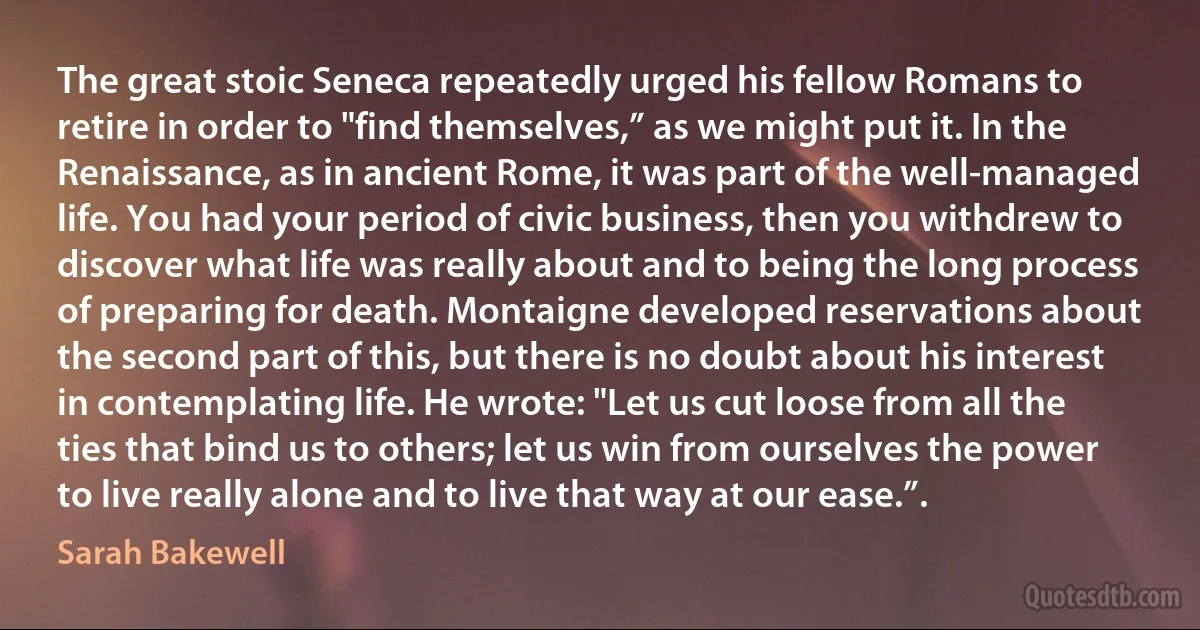
The great stoic Seneca repeatedly urged his fellow Romans to retire in order to "find themselves,” as we might put it. In the Renaissance, as in ancient Rome, it was part of the well-managed life. You had your period of civic business, then you withdrew to discover what life was really about and to being the long process of preparing for death. Montaigne developed reservations about the second part of this, but there is no doubt about his interest in contemplating life. He wrote: "Let us cut loose from all the ties that bind us to others; let us win from ourselves the power to live really alone and to live that way at our ease.”.
Sarah BakewellRelated topics
bind business cut death doubt ease fellow find great interest life live loose might order power renaissance second stoic way win others romeRelated quotes
During the lifetime of great revolutionaries, the oppressing classes relentlessly persecute them, and treat their teachings with malicious hostility, the most furious hatred and the most unscrupulous campaign of lies and slanders. After their death, attempts are made to convert them into harmless icons, to canonize them, so to say, and to surround their names with a certain halo for the "consolation" of the oppressed classes and with the object of duping them, while at the same time emasculating the revolutionary doctrine of its content, vulgarizing it and blunting its revolutionary edge.'

Vladimir Lenin
There are things about organized religion which I resent. Christ is revered as the Prince of Peace, but more blood has been shed in His name than any other figure in history. You show me one step forward in the name of religion and I'll show you a hundred retrogressions. Remember, they were men of God who destroyed the educational treasures at Alexandria, who perpetrated the Inquisition in Spain, who burned the witches at Salem. Over 25,000 organized religions flourish on this planet, but the followers of each think all the others are miserably misguided and probably evil as well.

Frank Sinatra
What is a charitable heart? It is a heart which is burning with love for the whole creation, for men, for the birds, for the beasts ... for all creatures. He who has such a heart cannot see or call to mind a creature without his eyes being filled with tears by reason of the immense compassion which seizes his heart; a heart which is softened and can no longer bear to see or learn from others of any suffering, even the smallest pain being inflicted upon a creature. That is why such a man never ceases to pray for the animals ... [He is] ... moved by the infinite pity which reigns in the hearts of those who are becoming united with God.

Isaac the Syrian
Do everything simply and meekly. Do nothing with an ulterior motive. Don't say, I'll do this in order to have that result, but do it naturally, without taking cognizance of it. That is, pray simply and don't think about what God will bestow on your soul. Don't make any calculations. You know, of course, what God bestows when you enter into communion with Him, but it is as if you don't know. Don't discuss the matter even with yourself. So when you repeat the prayer, "Lord Jesus Christ, have mercy on me”, say it simply and ingenuously and think of nothing other than the prayer. These are very delicate matters and the intervention of the grace of God is required.

Porphyrios of Kafsokalyvia
It is a fearful thing to hate whom God hath loved. To look upon another-his weaknesses, his sins, his faults, his defects is to look upon one who is suffering. He is suffering from negative passions, from the same sinful human corruption from which you yourself suffer. This is very important: do not look upon him with judgmental eyes of comparison, noting the sins you assume you'd never commit. Rather, see him as a fellow sufferer, a fellow human being who is in need of the very healing of which you are in need. Help him, love him, pray for him do unto him as you would have him do unto you.

Tikhon of Zadonsk
